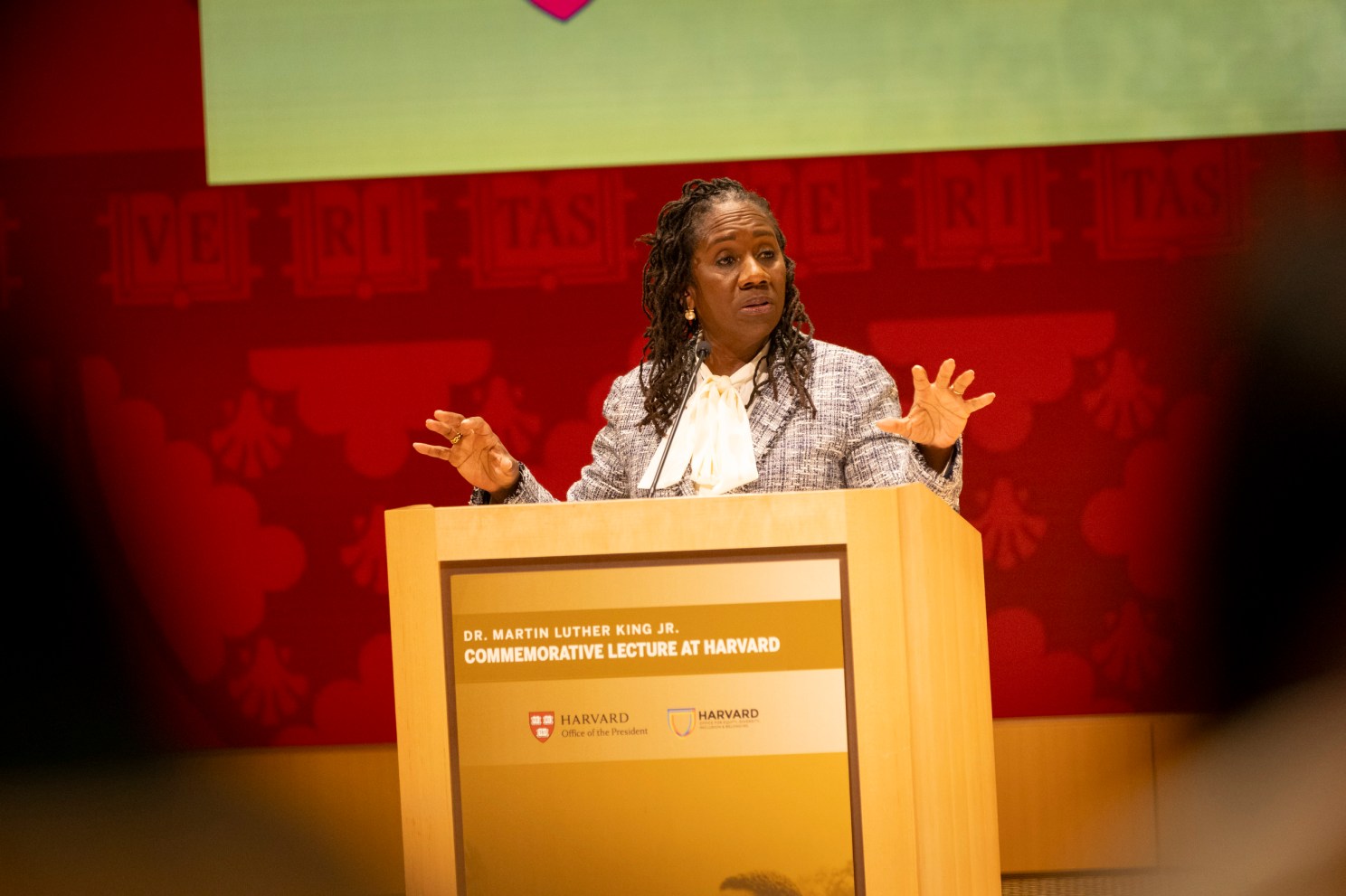
Sherrilyn Ifill delivers the Martin Luther King Jr. Commemorative Lecture.
Photos by Niles Singer/Harvard Staff Photographer
Time for ‘emergence of a new and better democracy’
Civil rights attorney and Howard professor Sherrilyn Ifill details need for national reckoning, greater civic involvement
“We are at a perilous moment in our country,” celebrated civil rights attorney Sherrilyn Ifill said Tuesday evening before hundreds at Klarman Hall. And the factors that brought us to this point of divisiveness are more persistent and pervasive than “any one man or any one election.”
“We’re here because over decades, we’ve left the foundations of our democracy largely unattended” and “embraced an anemic and vapid form of citizenship,” she said. “We’re here because as a nation, we have been too weak to face the truth of our history and the truth of our national identity,” one rooted in slavery and continued through systemic racism and white supremacy, realities the nation looked past for too long.
President Alan Garber and chief diversity and inclusion officer Sherri A. Charleston welcomed Ifill, who was president of the NAACP Legal Defense Fund from 2013 to 2022 and is now a professor at Howard University Law School. Ifill was selected to deliver the annual Dr. Martin Luther King Jr. Commemorative Lecture, which honors an individual whose public service, scholarship, or activism advances King’s lifelong work around racial justice, equality, and democratic ideals.
In her address, “Reimagining a New American Democracy,” Ifill said, “We are here because far too many have convinced themselves that the disease that is embedded in the DNA of America, racism and white supremacy, can coexist with healthy democracy. It cannot.”
Ifill reflected on how her life and the opportunities she had growing up in the 1960s and ’70s were profoundly different from those her nine older siblings and parents had, thanks to the victories won by previous generations who “found the courage to fight for a world they had never seen.”
“And that is what we are being called to do today. This is the work, as I have said, of founding a new American democracy, and it’s hard work,” said Ifill, who taught a seminar on the 14th Amendment at Harvard Law School last fall and will chair Howard’s new 14th Amendment Center for Law & Democracy, a multidisciplinary initiative focused on promoting equality and justice. “The emergence of a new and better democracy will come at a cost, but it will come.”
She criticized business leaders for enjoying the fruits of democracy but then saying they’re “agnostic” when things get messy, and took citizens to task for being eager to point out the flaws and failures of democracy, but not thinking they had any responsibilities to it beyond jury duty and voting every four years.
“We don’t show up for a school board meeting; we don’t show up for a city council meeting; we don’t call our representative; we don’t call our senator — we don’t do any of that stuff,” Ifill said. “We just expect them … ‘We voted for you; now make it happen.’ And then we love to be outraged when they don’t make it happen.”
The MLK lecture, which takes place in the fall in memory of King’s visit to Harvard Law School in October 1962, is an initiative launched three years ago by then-President Larry Bacow. His purpose was to offer a “new way for Harvard to participate in a critical and ongoing national conversation about racial justice, equity, and opportunity.”
Toward the end of this year’s event, Ifill had a discussion with David B. Wilkins, Lester Kissel Professor of Law at Harvard Law School. Wilkins, an expert on the legal profession, asked her what role lawyers play in the quest for a healthy, truly inclusive multiracial democracy.
Though some have damaged our norms and institutions in recent years, most “lawyers are leaders” and problem-solvers who are grounded in facts and the rule of law, which are foundational building blocks of any democracy, she said.
But it’s not their job alone. “Democracy is an ecosystem” in which we all have to do our part, Ifill said.
“I think we can all see that we need a fresh, new iteration of our democracy. Who’s going to do that — somebody else?” she said.
“We need to decide that we are going to be founders and framers of this new democracy, and that means behaving as though we have the right and the ability to literally shape this democracy.”




